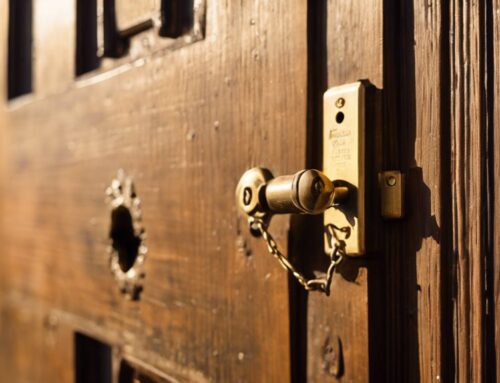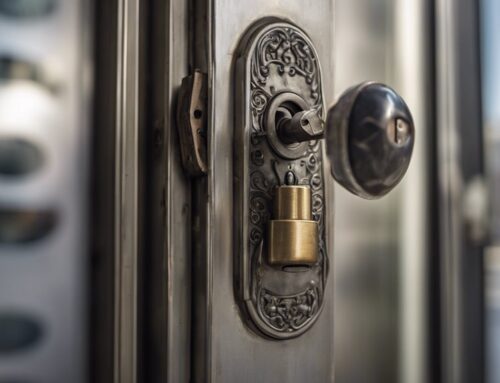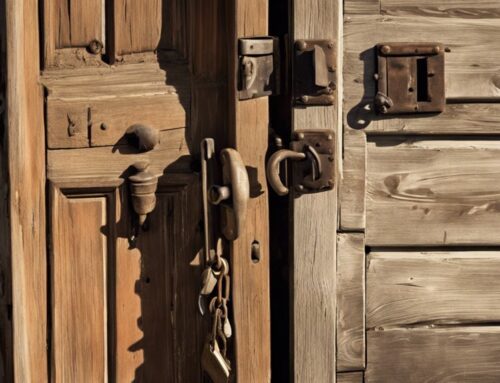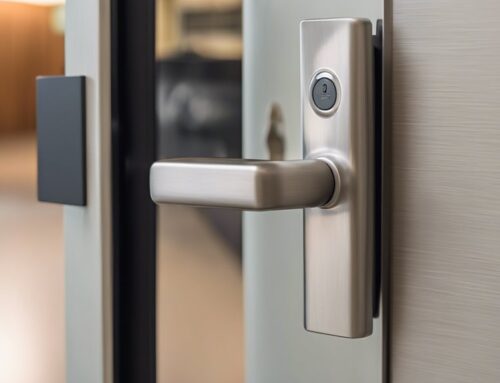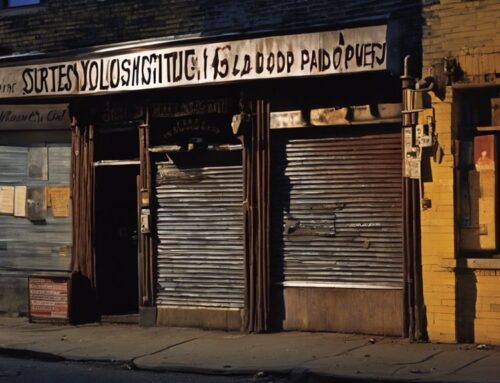Imagine trying to access a door without the right key—frustrating, isn't it? That's how maneuvering locksmith employment laws in Pennsylvania can feel if you're not familiar with the requirements. You've got local business licenses, age restrictions, and safety regulations to take into account, all of which can make or break your operation. It might seem overwhelming at first, but understanding these laws is essential for smooth sailing in your locksmith career. So, how do you guarantee you've got all the necessary keys to succeed in this business landscape?
Key Takeaways
- In Pennsylvania, locksmiths need a local business license; no state licensing is required for practice.
- The minimum employment age for locksmiths is 18, with special permits required for minors.
- Employers must maintain accurate records of minor employees and adhere to work hour regulations.
- Continuous education and certifications from ALOA are important for compliance with industry standards.
- Liability insurance is advised to protect locksmiths against damages and potential legal issues.
Locksmith Licensing Overview

While Pennsylvania doesn't mandate state licensing for locksmiths, understanding the local legal landscape is essential for anyone looking to operate in this field. In the absence of state-level requirements, your primary concern should be obtaining a business license from the local government. This step not only legitimizes your operation but also guarantees compliance with local regulations.
Even though the state doesn't mandate specific certifications, obtaining credentials from the Associated Locksmiths of America (ALOA) can greatly benefit your business. Certifications like Certified Registered Locksmith (CRL), Certified Professional Locksmith (CPL), and Certified Master Locksmith (CML) can enhance your credibility and professionalism. Though not legally required, these accolades help convince potential clients of your expertise. Furthermore, completing a six-day fundamental training course through ALOA provides foundational skills necessary for effective locksmithing.
Moreover, while there's no formal education or degree required, enrolling in specialty courses or apprenticeships under seasoned locksmiths is both beneficial and recommended. Practical experience is invaluable in this trade. Online training options, such as those provided by institutions like Penn Foster, make education more accessible. It's important to remember that continuous learning is essential to stay updated in the field and maintain competitiveness. Locksmiths can also learn about maintaining a license through local government requirements and the potential impact on their business.
Lastly, while the state doesn't enforce stringent compliance checks, obtaining liability insurance is prudent. It'll protect you against potential damages, adding an extra layer of security to your operations.
Adhering to local regulatory nuances, including possible registration with city authorities, can facilitate a smoother path to establishing your locksmith business. By staying updated with industry standards through trade associations, you can navigate this landscape effectively, guaranteeing both freedom and success in your locksmith endeavors.
Age Requirements for Employment
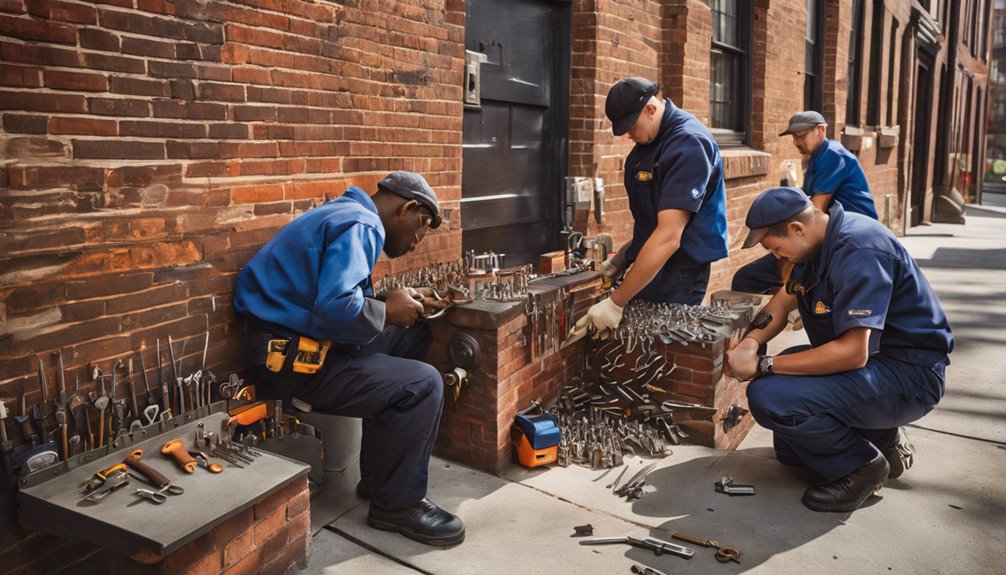
To work as a locksmith in Pennsylvania, you're required to be at least 18 years old, as minors under this age face restrictions dictated by child labor laws. These laws are in place to protect young individuals from hazardous occupations and guarantee they can balance work with education. In Pennsylvania, locksmiths play a crucial role during eviction procedures, ensuring compliance with legal frameworks. While some opportunities exist for minors, such as delivering newspapers or caddying, they can't engage in locksmithing due to the profession's safety concerns. Additionally, a solid understanding of essential skills is vital for those entering the locksmith field. Operating as a locksmith without a license can lead to severe penalties, as unlicensed locksmithing is illegal in Pennsylvania.
If you're under 18 and interested in obtaining work, you need a permit from your school district. This permit not only requires parental consent if you're under 16 but also a commitment to maintaining good academic standing.
Employers hiring minors must adhere strictly to these laws. They're responsible for notifying school officials about your employment and keeping accurate records of your hours and duties to prevent any legal repercussions.
Moreover, minors mustn't work beyond stipulated hours or engage in jobs without appropriate breaks, promoting a balance between work and education. Violations can lead to penalties for employers, reinforcing the importance of compliance.
Should you choose to enter the locksmithing field after reaching the minimum age, you'll find that the path opens up a wider range of opportunities, emphasizing personal freedom and career growth.
Understanding these age requirements guarantees you're prepared to navigate the legal landscape of locksmithing employment in Pennsylvania effectively. Your age not only defines eligibility but also shapes the framework within which you can pursue your career aspirations.
Education and Training Options

Obtaining the proper education and training is essential for aspiring locksmiths in Pennsylvania, ensuring they develop the necessary skills to excel in this profession. While Pennsylvania doesn't require a formal degree, various formal training programs are available through community colleges, vocational schools, and locksmith trade associations. These courses typically cover key making, different lock types, and electronic safety, allowing you to complete your training within 2 to 7 months.
Online options, like those from Penn Foster and Stratford, provide added flexibility. Knowledge of lock components is crucial to your training, as it allows you to effectively troubleshoot and repair locks. Locksmiths in Pennsylvania should also understand their potential liability in cases of break-ins to better protect themselves legally and professionally.
Specialized courses and certifications enable you to further demonstrate your expertise. The Associated Locksmiths of America (ALOA) offers certifications such as Certified Registered Locksmith and Certified Master Locksmith. These courses range from basic locksmithing skills to more advanced topics like safe manipulation and access control. Some certifications require extensive training and work experience. Prospective locksmiths in Pennsylvania should be aware of the specific guidelines for locksmith apprenticeships to ensure they meet all legal and training requirements.
Apprenticeships under seasoned locksmiths also present a valuable opportunity for practical understanding. By working closely with experienced professionals, you gain insights into technical, legal, and business aspects of the trade. Apprenticeships can be unpaid or provide stipends, often leading to job offers upon completion of your training.
Continued education is vital in this evolving field. Joining trade associations, attending industry seminars, and participating in manufacturer training helps you stay updated.
You may also find periodic classes covering various locksmithing topics to enhance your skills further and support your professional growth in Pennsylvania's locksmithing landscape.
Key Responsibilities of Locksmiths

As a locksmith, you'll handle essential tasks like lock installation techniques to guarantee security measures meet industry standards.
You'll also troubleshoot lock issues, diagnosing problems and implementing effective repairs. It's important to note that understanding Pennsylvania's lock picking laws is crucial for locksmiths to ensure they operate within legal boundaries while performing their duties.
Additionally, mastering key duplication processes is essential for maintaining accurate and secure access control for clients. In Pennsylvania, understanding the legal framework around key duplication is crucial to ensure compliance with state laws, including permissions and restrictions.
Lock Installation Techniques
Proper lock installation techniques are vital for guaranteeing security and functionality in any setting. Begin by measuring the door thickness; this guarantees compatibility with your chosen lock. Use the template provided with the lockset to accurately mark the keyhole and latch hole locations. As you drill, maintain correct alignment to assure a smooth fit. Utilizing a tape measure and a level at this stage will enhance precision, so double-check your measurements to prevent costly errors.
Next, fit the latch into the edge of the door, securing it in place with the provided screws. Carefully align the exterior and interior components of the lockset within the marked positions, tightening screws to solidify their connection. It is crucial for both residential and commercial properties in Pennsylvania to comply with essential safety standards, ensuring that locks offer maximum security and meet legal requirements.
Don't forget to install the strike plate on the door frame, allowing the latch to engage smoothly for reliable security. In Pennsylvania, businesses must ensure their locks meet state guidelines for high-security standards, ensuring robust protection against unauthorized access.
When necessary, incorporate peripheral locking devices such as door closers and panic bars, guaranteeing they conform to building codes. Properly align and secure all hardware before testing the entire assembly for functionality.
A methodical approach to these lock installation techniques is vital for safeguarding freedom through robust security.
Troubleshooting Lock Issues
When faced with lock issues, it's essential to recognize the key responsibilities of locksmiths in diagnosing and resolving problems efficiently. You may encounter various mechanical or electronic malfunctions that require an expert touch.
For instance, if your lock is stiff or sticking, accumulated dirt might be the culprit. A locksmith would apply a dry lubricant to restore functionality. Should a lock refuse to turn, it could be obstructed by debris, which you'd need assistance in removing. Locksmith Pennsylvania ensures rapid service with an average arrival time of 10-20 minutes for emergencies, providing quick and professional help when you need it most.
If your key won't go in, realignment of lock cylinders may be necessary, while a lock that turns but won't open often indicates a problem with the latch mechanism, requiring a realignment of components.
In the domain of electronic locks, a locksmith tackles battery issues by ensuring proper replacement, or they resolve connectivity problems to restore operation.
A locksmith service like Low Rate Locksmith offers certified technicians who are available 24/7 to ensure your lock issues are addressed in a timely and professional manner.
Ultimately, whether your issue involves a loose lock or a deadbolt that won't retract, a locksmith's expertise guarantees thorough troubleshooting.
Key Duplication Processes
Although key duplication may seem straightforward, it involves meticulous processes and techniques that require the expertise of a skilled locksmith. Understanding these methods is essential for maintaining security and guaranteeing consistency in key functionality.
Here's a breakdown of the key duplication processes you should know:
- Impressioning: Taking an impression of the original key's teeth to create a mould.
- Hand Key Cutting: Manually filing down a blank key to match the cuts, ideal for damaged keys.
- Machine Key Cutting: Utilizing a key duplicator where the original key guides the cutting blade.
- Deburring: Removing sharp edges from new keys with wire brushes or grinders.
- Maintaining Key Control: Keeping accurate records of keys, combinations, and lock locations for security. In Pennsylvania, locksmiths play a crucial role in foreclosure processes, ensuring properties are secured according to legal requirements.
Locksmiths also need to be aware of digital lock regulations that affect their services, ensuring compliance and staying informed as the field evolves.
Each method serves a unique purpose and requires specific equipment, such as key duplicators and hand tools.
By mastering these processes, you guarantee quality and security in your locksmith services, effectively safeguarding the freedom and safety of your clients.
Regularly updating your skills and knowledge about these techniques will also keep you compliant with industry standards and codes.
Compliance With Safety Regulations
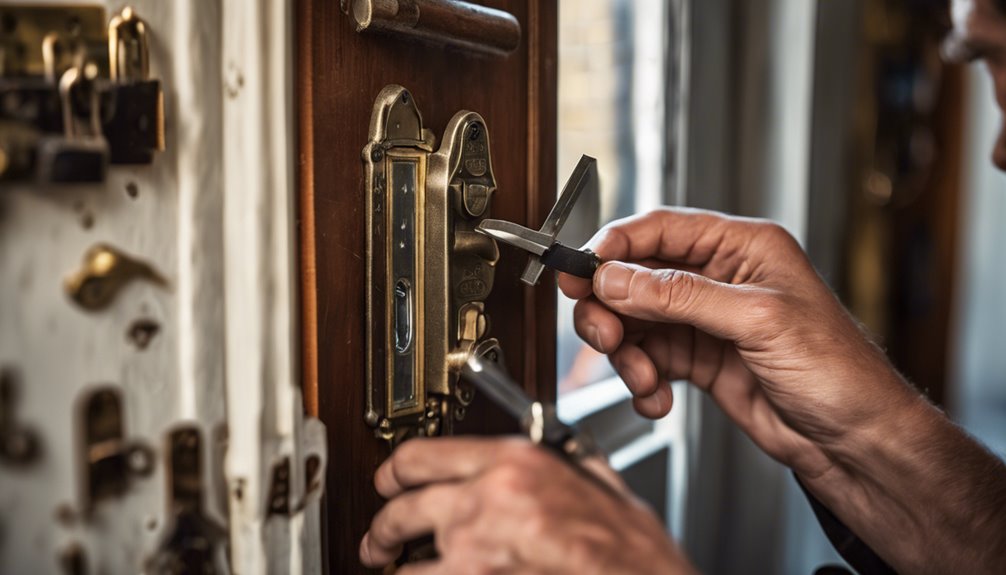
Compliance with safety regulations is fundamental for locksmiths to guarantee a secure work environment and mitigate risks associated with their trade. Being aware of and adhering to both OSHA guidelines and state safety protocols is crucial for you as a locksmith. OSHA provides a framework that mandates proper training in electrical and machine safeguarding, along with the appropriate use of personal protective equipment. In Pennsylvania, it is also important for businesses to ensure ADA compliance for locks and security systems, ensuring accessibility for all individuals.
| Safety Aspect | OSHA Regulations | State Protocols |
|---|---|---|
| Personal Protective Equipment | Required training and use | Included in safety programs |
| Hazard Communication | Standard guidelines established | Must communicate hazards |
| Lockout/Tagout Procedures | Mandatory for safety | Integral for safety compliance |
| Fire Prevention Practices | Fire safety protocols enforced | Required within safety programs |
In addition, Pennsylvania mandates specific safety protocols, including fire prevention and hearing conservation, which must be integrated into your health programs. Understanding hazard precautions related to your tools and knowledge of safety codes is essential for performing installations and repairs safely. You should also be familiar with the risks of slips, trips, and falls, ensuring a thorough safety approach in your work.
Implementing these practices not only protects you but also your clients. Regular training and adherence to guidelines provide a framework for safely managing installations, repairs, and the handling of security devices. Ultimately, compliance with safety regulations is not merely a legal obligation but a foundation for professional integrity within the locksmith industry.
Understanding Compensation Structures

When it comes to compensation structures for locksmiths in Pennsylvania, understanding the distinctions between salary and percentage pay is essential.
You need to be aware of overtime regulations, as they can greatly impact your earnings when working beyond standard hours.
Familiarizing yourself with these components will guarantee you're prepared for the financial aspects of your locksmith career.
Salary vs. Percentage Pay
Understanding how locksmiths in Pennsylvania are compensated requires a closer look at the two primary structures: salary and percentage pay. Both methods offer distinct benefits and considerations that you should weigh based on your individual circumstances and career goals.
Salary Structure
- Average annual salary is about $53,663.
- Entry-level locksmiths earn roughly $51,103.
- Salaries range from $47,019 to $59,246.
- Most professionals earn between $40,969 and $64,328.
- Historical minimums guaranteed fair wages based on city size.
Percentage Pay
- Percentage-based workers receive at least the minimum wage guarantee.
- Part-time workers also benefit from this wage protection.
- This structure promotes consistency across various employment types.
- Percentage earnings can yield increased take-home pay during high-demand periods.
- It aligns with minimum wage laws, enhancing job security.
Choosing between salary and percentage pay impacts not just your earnings but also your financial autonomy.
Weigh the predictability of a regular salary against the potential for increased earnings through percentage pay based on performance and demand.
Understanding these structures will empower you to make informed decisions for your career in locksmithing.
Overtime Regulations Explained
Overtime regulations in Pennsylvania play an essential role in ensuring that you receive fair compensation for your extra hours, especially if you're a locksmith working beyond the standard 40-hour week.
Most employees, including locksmiths, are eligible for overtime pay unless you meet specific exemption criteria. To be exempt, you must pass the salary level test and fulfill the requirements for executive, administrative, or professional duties, with a salary threshold set at $875 per week or $45,500 annually as of October 3, 2022.
For those non-exempt employees, overtime pay is calculated at 1.5 times your regular hourly wage for all hours worked over 40 in a week.
It's vital to know that overtime wages must be paid in the next paycheck following the period worked, and compensatory time off isn't an option in Pennsylvania. If you're a tipped employee, the 80/20 rule applies, meaning that non-tipped duties shouldn't exceed 20% of your workweek.
For compliance, your employer must adhere to both the Fair Labor Standards Act (FLSA) and the Pennsylvania Minimum Wage Act, ensuring that regulations favoring employee rights are prioritized.
Working Hours and Overtime

Although locksmiths and junior locksmiths typically shouldn't exceed 40 hours of work per week, emergency situations can necessitate longer hours, allowing for a maximum of 48 hours.
Understanding your rights and obligations regarding working hours and overtime is crucial for maintaining a balance between work and personal life.
Here are some key points to take into account regarding your working hours:
- Standard Hours: Regular work should cap at 40 hours weekly.
- Emergency Provisions: Up to 48 hours may be permitted during emergencies.
- Overtime Compensation: You'll earn time and a half for hours exceeding the standard, providing financial incentive for extra work.
- Supervision Requirement: Junior locksmiths must always work under the guidance of a competent locksmith, guaranteeing safety and compliance.
- Overtime Calculation: Confirm that any overtime calculations include your total hours, hourly rate, and any commissions or bonuses.
Local and State Regulations

Locksmiths in Pennsylvania must navigate a variety of local and state regulations that govern their practice. While you won't need a specific state license for locksmithing, be aware that if your annual earnings exceed $5,000, you'll need a Home Improvement Contractors license. This license is managed by the Attorney General's Office and requires you to provide a physical mailing address and proof of insurance. The application fee for a two-year license is $52, which is a relatively small investment considering the potential growth of your business.
Although there are no mandated school requirements for becoming a locksmith, completing recognized training programs is highly recommended. These programs often encompass coursework in key identification, lock mechanisms, and various security systems, equipping you with fundamental skills. Hands-on experience through apprenticeships can further enhance your practical knowledge while specialized courses will help you broaden your expertise in business operations and industry trends.
In addition to licensing, compliance with federal, state, and local labor laws is vital. You must adhere to the Pennsylvania Human Relations Act, particularly regarding the employment of minors. If you hire minors, make sure they obtain work permits and maintain accurate records of their hours and duties.
Even in the absence of state-wide licensing, remember that local regulations may require you to acquire business licenses or permits specific to your area. Keeping informed about these local requirements will help you operate more effectively in your locksmith practice.
Importance of Professional Certifications

Professional certifications play an essential role in establishing a locksmith's reputation and trustworthiness within the industry. By obtaining recognized certifications, you elevate your professional credibility and demonstrate your commitment to excellence. This can set you apart in a competitive market while assuring clients of your expertise.
Here are some key benefits of professional certifications:
- Enhanced Credibility: Certifications from bodies like ALOA suggest a high level of skill, making you more reliable.
- Career Advancement: Higher-level certifications often lead to better job opportunities, increased salary potential, and specialized career paths.
- Specialization: Credentials in areas like automotive locksmithing or safe technology make you an attractive option for clients seeking specific services.
- Continuing Education: Many certifications require ongoing learning, ensuring you stay updated on the latest technology and techniques.
- Competitive Edge: Certified locksmiths differentiate themselves from non-certified competitors, attracting more clients and fostering trust.
Investing in professional certifications not only enhances your skills but also contributes to your long-term career growth.
As the locksmithing landscape continually evolves, keeping your knowledge current is essential. Certifications reflect your dedication to ethical practices and ongoing improvement, imperative elements for anyone aiming to thrive in the industry.
Embracing professional certifications can meaningfully impact your career trajectory, allowing you to navigate the locksmithing profession with confidence and freedom.
Frequently Asked Questions
Can a Locksmith Work Without a State-Issued Business License?
Yes, you can work as a locksmith in Pennsylvania without a state-issued business license, since no such license is required.
However, you'll need to be aware of local regulations that may mandate specific licenses or permits. If your earnings exceed $5,000 annually, you'll need a Home Improvement Contractor's license.
Additionally, make sure you comply with any relevant business licensing regulations to avoid legal complications and maintain a professional reputation in your community.
What Should I Do if My Locksmith Is Not Compliant With Local Regulations?
If your locksmith isn't compliant with local regulations, first, confirm their credentials, like a Home Improvement Contractors license.
Check their advertising and contracts for a registration number.
Notify them about the specific regulations they're violating and guide them toward the Pennsylvania Attorney General's Office for resources.
If they refuse to comply, you can report them using the HIC Consumer Helpline.
Document everything to support your complaint against their non-compliance.
Are Locksmiths Required to Have Insurance in Pennsylvania?
As the old saying goes, "An ounce of prevention is worth a pound of cure."
In Pennsylvania, while locksmiths aren't mandated by state law to carry insurance, obtaining it's a wise move.
General liability insurance is often needed by property owners, and if you're working as a home improvement contractor, insurance is necessary to secure your license.
Plus, it protects you from potential liabilities, safeguarding both your business and your clients.
Can Junior Locksmiths Work Independently on Projects?
No, junior locksmiths can't work independently on projects.
They're required to operate under the supervision of a competent locksmith. This restriction guarantees they're guided properly as they gain experience.
You might find it limiting, but this rule protects both the junior locksmith and the clients. Independent work isn't allowed for those still in training, maintaining high safety and quality standards in the locksmithing field.
What Qualifications Does an Employer Look for in a Locksmith?
When employers seek a locksmith, they look for a blend of qualifications and experience.
You'll need practical knowledge of various locks and repair techniques. Employers value certifications—like Certified Licensed Locksmith (CLL)—which boost your credibility.
Completing an apprenticeship or training program can also set you apart. Having a valid driver's license and general liability insurance may be necessary for certain positions, ensuring you're prepared for the demands of the job.
Conclusion
Steering through locksmith employment laws in Pennsylvania is like threading a needle in a bustling marketplace; precision and attention to detail are essential. By understanding local licensing requirements, age restrictions, training options, and safety regulations, you'll not only comply with the law but also foster a professional environment. Staying informed about compensation and working hours enhances your business's reputation. Ultimately, investing in your knowledge guarantees that you're well-equipped to access the doors to success in this industry.





